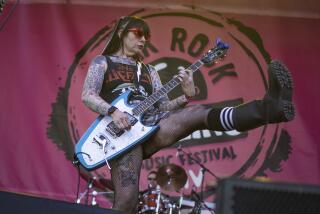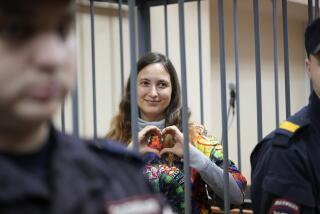Pussy Riot and protest: Punk band prompts benefit efforts
Russian punk band Pussy Riot, which is awaiting the verdict in a trial of its three members on hooliganism charges, has over the last six months generated worldwide attention after a clip of the group protesting connections between the Russian Orthodox church and Vladamir Putin’s administration drew the ire of powers that be. In the process, Pussy Riot has become a symbol not only of defiance in the face of authoritarian power but also of the ongoing vitality of the three-chords-and-a-voice template of punk rock.
The act’s plight has prompted a number of artists to work on the band’s behalf to bring awareness -- and money -- to its cause. On Thursday night at Liberty Hall in New York, artists including Chloe Sevigny, Eileen Myles, Karen Finley, Johanna Fateman and Mx Justin Vivian Bond will gather to read the writings of the three accused members of Pussy Riot, Maria Alekhina, Nadezhda Tolokonnikova and Ekaterina Samucevich. (The reading will be streamed live at 7:30 p.m. EST here.)
As well, musician-performance artist Peaches has gathered like-minded peers such as the Hives, Wayne Kramer (MC5), Kate Nash, JD Samson (Le Tigre, Men), Nick Zinner (Yeah Yeah Yeahs), Lykke Li, Miike Snow, Peter Bjorn & John, and the Knife, among others, to represent the outrage via a new music video for Peaches’ song “Free Pussy Riot!.”
PHOTOS: Russian punk rockers on trial
In a statement, Peaches wrote: “As a musician who has spoken out against political figures, I am deeply troubled that the Russian government is punishing its citizens for voicing their opinions through music. Music is an essential tool for voicing opinions about everything from gender to oppression. To outlaw the free expression of these ideas is to embrace tyranny. Letting artists speak is the hallmark of a free society.”
Indeed, the free expression inherent in punk is a perfect vehicle for protest, and not just in Russia. A few years ago, when I was traveling through Myanmar with Los Angeles band Ozamatli, which was touring as cultural diplomats for the U.S. State Department, whispers of a punk scene became known via a few strategically placed bits of protest graffiti in the country’s most populous city, Yangon. This was before the country began the process of relaxing its military rule, allowing for free elections and the release of Nobel laureate Aung San Suu Kyi from house arrest. But little cracks were starting to appear in the junta’s facade.
The most prominent was a simple declaration spray-painted in black on one of the city’s most prominent boulevards: It read, simply, “Punk’s Not Dead,” and though it certainly wasn’t proof of a crumbling regime, the phrase, and all the meanings within the simple statement, suggested unrest.
Whether Pussy Riot’s trial in Moscow is evidence of something bigger at work is yet to be seen, but the seriousness with which the judicial system has pursued the case suggests that governments continue to fear the power of punk expression. And that despite the Hot Topic-ification of American punk rock, in other parts of the world the defiant undercurrent of those three chords can carry powerful messages far more vital than simply protesting Mom and Dad’s new curfew dictate.
ALSO:
Live review: Grandaddy turns back the clock at the Fonda
Wisconsin shooting brings secretive white power music into focus
Jimmy Cliff, Tim Armstrong and more make music across generations
Twitter: @liledit
More to Read
The biggest entertainment stories
Get our big stories about Hollywood, film, television, music, arts, culture and more right in your inbox as soon as they publish.
You may occasionally receive promotional content from the Los Angeles Times.








